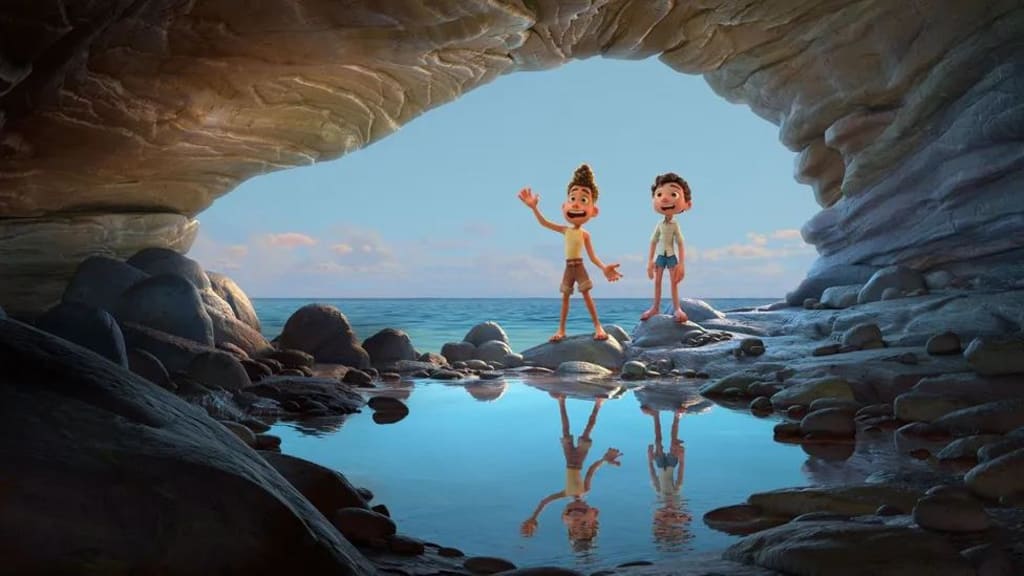Luca is 'personal and charming'
Pixar and Disney's latest animation Luca is 'a delight', a gentle yarn that induces nostalgia for youthful summer holidays, writes Nicholas Barber.

If you don't live in Italy, and you don't have a holiday booked there, then watching Luca might be the next best thing. The new Disney-Pixar film is set in and around an idealised Riviera village, a rustic paradise of trattorias, vineyards, and crumbling town squares with fountains in the middle. In fact, celebrating the Italian dolce vita could well be the cartoon's main purpose. A gelato-sweet coming-of-age fantasy, Luca is inspired in part by The Little Mermaid, but mostly by the childhood of its director, Enrico Casarosa, an animation veteran who makes his debut as a feature director here. Instead of aiming for the metaphysical profundity of Pixar's last offering, Soul, or the mythological sprawl of Disney's recent action-epic, Raya and the Last Dragon, Casarosa has crafted a modest and gentle yarn about a few good-natured people in a small area, and their enviably simple way of life. His cartoon is aimed at the heart – and the tastebuds – rather than the brain. And it's no less of a delight for that.
Its hero, Luca (voiced by Jacob Tremblay), is like any other young boy except that he has pale green skin, blue freckles and a long tail, and he lives at the bottom of the sunlit ocean. He and his family of merpeople are the aquatic equivalent of peasant farmers: Luca himself is a shepherd who tends to a flock of bleating fish. Yes, the fish bleat, which is the kind of endearing detail – along with the way objects float around so slowly underwater – that makes you wish Casarosa had set more scenes in the merpeople's society. But perhaps we can look forward to those in the sequel. A short spin-off featuring a certain character voiced by Sacha Baron Cohen is inevitable.
In the meantime, Luca is fascinated by the "Land Monsters" who putter overhead in their fishing boats. His cautious mother (Maya Rudolph) warns him to stay away from these harpoon-wielding predators, but another boy, Alberto (Jack Dylan Grazer), coaxes him out of the waves and on to the beach. Alberto is a familiar character in European cinema: Casarosa pays tribute to all those films in which a cocky older boy with no shoes, no responsibilities, and seemingly no family leads the hero astray. The difference in this case, of course, is that Alberto is a sea creature, but the screenplay dispenses with that potential problem as briskly and breezily as it does all the others. When merpeople dry off, they turn into ordinary, tail-less humans, so once Luca has learnt to walk on two legs – a joyous little physical comedy set piece – the new best friends can wander around without raising suspicion, just as long as they watch out for stray glasses of water and sudden rain showers: "The sky's been leaking," yelps Alberto after a downpour one morning.
The film doesn't exactly overturn any national stereotypes, but there is a host of Italian consultants listed in the end credits to make you feel better about the clichés
A wide-eyed dreamer, Luca is entranced by what the "surface" has to offer, and what Casarosa and his team present with such glowing affection. Everything looks gorgeously warm and bright, from the lush long grass to the dazzling clear blue sky; from the pastel houses tumbling down a hillside to the faded posters advertising La Strada and Roman Holiday. (Presumably the setting is the mid-1950s, not that it matters.) But what Luca is drawn to most of all, even more than pasta, ice cream and opera, is the prospect of exploring the planet on a Vespa. No, the film doesn't exactly overturn any national stereotypes, but there is a host of Italian consultants listed in the end credits to make you feel better about the clichés. As for Vespa, the scooter company couldn't ask for a more compelling advert.
Luca and Alberto figure out that the only way to obtain a Vespa of their own is to visit the town of Portorosso (named in homage to a Studio Ghibli cartoon, Porco Rosso), even if it is populated by fishermen and would-be sea-monster-hunters. To raise enough money, though, they have to win a prize in a local children's "triathlon" consisting of swimming, cycling and pasta-eating. And that means teaming up with a determined human girl, Giulia (Emma Berman), who feels as if she is as much of a fish out of water as they are.
At this stage, you may experience a pang of disappointment that a story about a shape-shifting sub-mariner marvelling at the human world has switched to a story about a boy training for a bike race. Even an animation as personal and charming as this one, it seems, isn't immune to Pixar-itis: the chronic compulsion to cram in at least one plot too many. But it's definitely personal and charming.
Luca himself is an immediately loveable hero, thanks both to Tremblay's eager and earnest voicework and to the soft, blobby, Aardman-esque character design. And despite the supernatural metamorphoses, his adventures are recognisable enough to make you nostalgic for your own youthful summer holidays or wistful that they weren't as carefree as his. Casarosa's film includes some piquant thoughts on education, family, bravery and fear. But, more than anything, it is an irresistible ode to a region and its culture. Watching it is like relaxing in the sunshine.
About the Creator
Sue Torres
Is there any other reason to live to change the world?






Comments
There are no comments for this story
Be the first to respond and start the conversation.